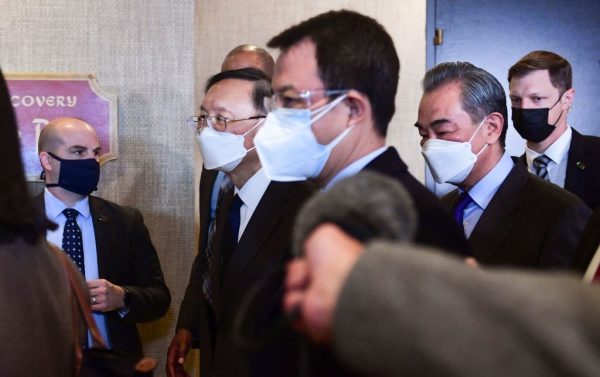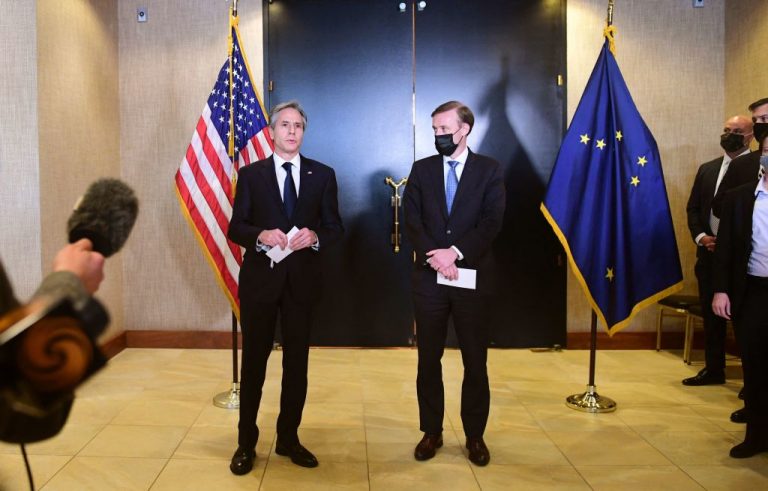The first meeting between representatives of the People’s Republic of China (PRC) and United States got off to a rocky start as Chinese delegates put Secretary of State Antony Blinken and National Security Advisor Jake Sullivan on the back foot from the opening remarks in the recent Anchorage talks.
The foreign ministers of both countries met in Anchorage, Alaska on March 18 and March 19. The location marks the halfway point for flight between the U.S. and China. PRC Foreign Minister Wang Yi called the talks “a refueling station for China-U.S. exchanges and also a place that China and the United States can meet each other halfway,” in what became a 15-minute diatribe by the PRC delegation in response to Blinken and Sullivan’s opening remarks.
Blinken spoke of the need to strengthen the “rules-based international order,” while expressing America’s hopes to “discuss our deep concerns with actions by China, including in Xinjiang, Hong Kong, Taiwan, cyber attacks on the United States, and economic coercion toward our allies.”
Sullivan added that the “overriding priority from the United States’ side is to ensure that our approach in the world and our approach to China benefits the American people and protects the interests of our allies and partners,” and that the U.S. “welcome stiff competition” with China.
‘Great power diplomacy’
Opening comments with the press present are usually limited to a few moments for statements from each side. However, the Anchorage meeting devolved into over an hour of public speaking, as Blinken’s opening remarks appeared to evoke the ire of Chinese Director of the Office of the Central Commission for Foreign Affairs, Yang Jiechi, and Wang Yi.
Success
You are now signed up for our newsletter
Success
Check your email to complete sign up
Yang is the top diplomatic officer of the Chinese Communist Party (CCP), while Wang is the foreign minister of the Chinese state itself. The two diplomats appeared to be carrying out what the Xi Jinping leadership calls “great power diplomacy” — replete with aggressive, rules-flouting rhetoric and threats that has earned the derisive moniker “wolf warrior diplomacy.”
While Blinken had billed the meeting as an initial dialogue, the CCP termed the summit as a “high-level strategic dialogue” that the CCP side was attending “at the invitation of the United States.”
The U.S. side ignored the Chinese comments and pressed forward with its defense of the international “rules-based order,” with Blinken warning of the consequences should this order fail:
“The alternative to a rules-based order is a world in which might makes right and winners take all, and that would be a far more violent and unstable world for all of us.”
China does present the greatest existential threat to our country, and we need an administration — I think the American people will demand an administration — that pushes back against that and protects us all.
Former U.S. Secretary of State Mike Pompeo on the Anchorage talks
Blinken continued, saying the Biden administration had “deep concerns with actions by China, including in Xinjiang, Hong Kong, Taiwan, cyberattacks on the United States and economic coercion toward our allies,” adding “Each of these actions threaten the rules-based order that maintains global stability.”
While establishment media and observers said the Blinker-Sullivan team had expressed a tough stance on Beijing, the duo made little more than brief mention of the CCP’s gross human rights abuses, such as the ongoing genocidal campaign against the Uyghur Muslims. The Biden administration has also avoided the topic of forced organ harvesting from prisoners of conscience altogether, contrasting with the State Department of the previous administration.
Communist monologue
Yang responded with a series of CCP propaganda talking points about the regime’s 14th 5-Year Plan, claims of “important strategic gains in fighting COVID-19,” and “full victory in ending absolute poverty in China.”
Jarring with the U.S. team’s effort to meet Beijing halfway, Yang also chided the United States for trying to handle China “in a condescending way from a position of strength,” while boasting that the U.S. “does not have the qualification” to do so.
Yang’s diatribe went to claim that the CCP’s Marxist-Leninst values “are the same as the common values of humanity. Those are: peace, development, fairness, justice, freedom and democracy.”
Scholars and historians estimate that the CCP’s rule has resulted in the unnatural deaths of 60 to 80 million people, with tens of millions of those deaths occurring in the man-made famine of 1959–1962.
Yang also took issue with the Biden administration’s internationalist doctrine, calling it an extension of U.S. hegemony: “What China and the international community follow or uphold is the United Nations-centered international system and the international order underpinned by international law, not what is advocated by a small number of countries of the so-called rules-based international order.”

In his monologue, Yang claimed the Chinese citizens were fond of the autocratic regime and supportive of the communist system and the draconian censorship and surveillance that comes with it, “In China, according to opinion polls, the leaders of China have the wide support of the Chinese people…No attempt to smear China’s social system would get anywhere.”
“Facts have shown that such practices would only lead the Chinese people to rally more closely around the Communist Party of China and work steadily towards the goals that we have set for ourselves.”
At the same time, Yang emphasized the importance of foreign investment in China, a pillar of the CCP’s ability to survive in an international community becoming increasingly wary of Chinese intellectual property theft, cyberattacks, bullying, and subversion.
“And I believe that for our two countries, under the new circumstances, we need to enhance communication, properly manage our differences and expand our cooperation instead of engaging in confrontation.”
Propaganda value
SinoInsider, a political risk consultancy that specializes in the factional politics of the CCP, said in a March 22 newsletter that the remarks made by Yang and Wang would probably have essentially been the same no matter what attitude the U.S. side took.
“The CCP believes that it is now superior to the United States; Yang and Wang were not reacting to what Blinken and Sullivan said that day, but to the PRC’s analysis of present American strength and approach to China,” the newsletter reads. “The CCP believes that ‘the East is rising and the West is in decline,’ and found an opportunity to drive home this point to the rest of the world by deliberately humiliating the U.S. on her own territory.”
Before the meeting began, on March 16 Blinken’s State Department placed sanctions on more than a dozen CCP officials as a result of the mainland’s violation of its treaty with the United Kingdom to provide “One Country, Two Systems” democracy protection to Hong Kong until 2047.
Former U.S. Secretary of State Mike Pompeo commended the Biden administration for the move, saying it had given him “hope for optimism,” “They took good actions against their senior leaders, with respect to Hong Kong the day before yesterday,” he said in an interview with Fox News.
“These meetings in Anchorage, we should have those conversations, but no one should mistake conversations for actions. No one should mistake words for deeds.”
In statements given to the press following the event, which concluded without particular incident, Blinken said, “We certainly know and knew going in that there are a number of areas where we are fundamentally at odds…it’s no surprise that when we raised those issues clearly and directly, we got a defensive response.”
“What we need to see the administration doing is what we [the Trump administration] did..When they’re violating basic norms for trade, we need to impose costs on them. President Trump placed tariffs on Chinese products. When they’re stealing our secrets, we kick them out of the consulate in Houston when they were conducting espionage there. You need real deeds, real action.”
Pompeo continued, “China does present the greatest existential threat to our country, and we need an administration — I think the American people will demand an administration — that pushes back against that and protects us all.”
Jospeh Miller, of the conservative outlet Newsmax, said ahead of the meeting on March 14 that the decision to “meet China halfway” was in itself an unwise concession to Beijing. He continued, saying that former President Donald Trump told him the night before that “he would never go and do that. He would make the Chinese come over to Washington to have the meeting.”
Blinken spoke positively on the closed-door portions of America’s meeting with the Chinese regime, calling it a “very candid conversation over these many hours on an expansive agenda…On Iran, on North Korea, on Afghanistan, on climate, our interests intersect.”
Jake Sullivan concluded the statements by saying, “We’ll continue to work with China going forward.”
















